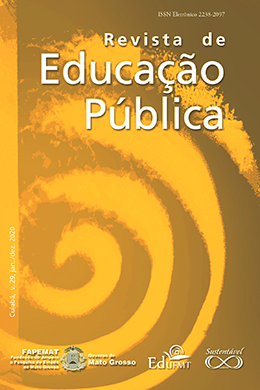Uma Abordagem Sociogenética do Núcleo Central das Representações Sociais: O caso da esfera pública brasileira
DOI:
https://doi.org/10.29286/rep.v29ijan/dez.10485Palavras-chave:
Representações Sociais, Núcleo Central, Narrativa, Dialogicidade, Polifasia CognitivaResumo
O artigo visa demonstrar como o tempo histórico e a comunicação se inscrevem na organização interna das representações sociais. Para tal, apresenta uma discussão sobre o papel do núcleo central das representações nos processos de continuidade e mudança em ideias e esferas públicas. Estudos de Jean-Claude Abric sobre a estrutura interna dos campos representacionais contribuem para a proposição de um desenvolvimento da teoria do núcleo central que repousa sobre um diálogo com a teoria narrativa, a dialogicidade e a polifasia cognitiva. Em outros termos, introduz uma perspectiva sociogenética para o estudo do núcleo central, que tenta elucidar como a organização sociocognitiva dos campos representacionais é formada e ao mesmo tempo dá forma à continuidade e à mudança em esferas públicas.
Downloads
Referências
ABRIC, J-C. Central System, Peripheral System: Their functions and roles in the dynamic of social representations. Papers on Social Representations, Lisboa, v. 2, n. 2, p. 75-78, Mar. 1993. Disponível em: <http://psr.iscte-iul.pt/index.php/PSR/article/view/126/90>. Acesso em: 23 abr. 2020.
ABRIC, J-C. A structural approach to social representations. In: DEAUX, K.; PHILOGÉNE, G. (Org.). Representations of the Social. Oxford: Blackwell, 2001. p. 42-47.
ALENCAR, J. O Guarani: um romance histórico. Rio de Janeiro: Editora Ática, 1982. Originalmente publicado em 1857.
AMARAL, Tarsila do. Abaporu. 1928. 1 original de arte, óleo sobre tela, 85 cm x 72 cm. Museu de Arte Latino-Americana de Buenos Aires (MALBA).
ALVES, Maria Helena Moreira; EVANSON, Philip. Living in the Crossfire – Favela Residents, Drug Dealers and Police Violence in Rio de Janeiro. Philadelphie, Temple University Press, 2011. 241 p.
ANDERSON, B. Imagined Communities: Reflections on the origins and spread of nationalism. London: Verson, 1983.
ANDRADE, C. D. A Gilberto Freyre. In: FREYRE, G. Casa-grande & Senzala: formação da família brasileira sob o regime da economia patriarcal. 51. ed. São Paulo: Global, 2006.
ANDRADE, O. Obras completas: Pau Brasil. Rio de Janeiro: Editora Globo, 2003. 230 p. Originalmente publicado em 1924.
ANDRADE, O. Anthropophagus Manifest. In: Tropicalia: A Revolution in Brazilian Culture. São Paulo: Cosac Naify, 2005. p. 205-207. Originalmente publicado em 1928.
BAUER, M. W.; GASKELL, G. Towards a paradigm for research on social representations. Journal for the Theory of Social Behaviour, Oxford, n. 29, v. 2, p. 163-186, Dec. 1999. Disponível em: <https://onlinelibrary.wiley.com/doi/abs/10.1111/1468-5914.00096>. Acesso em: 23 abr. 2020.
BORGES, D. Puffy, ugly, slothful and inert: Degeneration in Brazilian social thought, 1880-1940. Journal of Latin American Studies, Cambridge, n. 25, p. 235-256, May 1993.
BOSI, A. Dialética da Colonização. São Paulo: Companhia das Letras, 1992.
BOSI, E. Memória e Sociedade: Lembranças de velhos. São Paulo: T. A. Queiroz Editor, 1983.
BOSI, E. O Tempo Vivo da Memória: Ensaios de Psicologia Social. São Paulo: Ateliê Editorial, 2003.
BRUNER, J. Acts of Meaning. Cambridge, MA: Harvard: Harvard University Press, 1990.
BRUNER, J. Life as narrative. Social Research: an international quarterly, v. 71, n. 3, p. 691-710, 2004. Originalmente publicado em 1987.
BURKE, P.; PALLARES-BURKE, M. L. Gilberto Freyre: Social theory in the tropics. Oxford: Peter Lang, 2008.
CANCLINI, N. G. Hybrid Cultures: Strategies to enter and leave modernity. Minneapolis: University of Minnesota Press, 1995.
DA MATTA, R. Carnivals, Rogues and Heroes: An interpretation of the Brazilian dilemma. Notre Dame and London: University of Notre Dame Press, 1991.
DOISE, W. Les représentations sociales: définition d’un concept/ Social representations: Definition of the concept. In: DOISE, W.; PALMONARI, A. (Ed.). L’étude des représentations sociales. Neuchâtel: Delachaux et Niestlé, 1985. p. 81-94.
DOISE, W. Individual Cognitive Functioning: Societal aspects. In: HIMMELWEIT, H. T.; GASKELL, G. (Org.). Societal Psychology. London: Sage, 1990.
FILGUEIRAS, F. A tolerância à corrupção no Brasil: uma antinomia entre normas morais e prática social. Opinião Pública, Campinas, v. 15, n. 2, p. 386-421, nov. 2009. Disponível em: <http://www.scielo.br/scielo.php?script=sci_arttext&pid=S0104-62762009000200005>. Acesso em: 23 abr. 2020.
FREUD, S. Remembering, Repeating and Working-Through (Further recommendations on the technique of psychoanalysis II). The Standard Edition of the Complete Psychological Works of Sigmund Freud, Volume XII (1911-1913): The case of Schreber, Papers on Technique and Other Works, 145-156. Originalmente publicado em 1914.
FREYRE, G. Casa Grande e Senzala: Formação da Família Brasileira sob o regime da Economia Patriarcal. 25. ed. Rio de Janeiro: José Olympio, 1987.
GERGEN, K. Social Psychology as History. Journal of Personality and Social Psychology, Washington, v. 26, n. 2, p. 309-320, May 1973. Disponível em: <https://www.researchgate.net/publication/302871165_Social_Psychology_as_History>. Acesso em: 23 abr. 2020.
GILLESPIE, A. Social representations, alternative representations and semantic barriers. Journal for the Theory of Social Behaviour, Londres, v. 38, n. 4, p. 375-391, Dec. 2008. Disponível em: <http://eprints.lse.ac.uk/38693/1/Social_representations%2C_alternative_representations_and_semantic_barriers_%28LSERO%29.pdf>. Acesso em: 23 abr. 2020.
GOBINEAU, A. Arthur de Gobineau et le Brésil: Correspondance diplomatique du ministre de France à Rio de Janeiro, 1869-1870 (Correspondance politique d’Arthur de Gobineau). Grenoble: Presses Universitaires de Grenoble, 1990.
HALBWACHS, M. On Collective Memory. Chicago; London: The University of Chicago Press, 1992.
HOBSBAWM, E. Introduction: Inventing Traditions. In: HOBSBAWM, E.; RANGER, T. (Org.). The Invention of Tradition. Cambridge: Cambridge University Press, 1983.
JAMES, W. The Will to Believe and Other Essays in Popular Philosophy. New York: Dover Publications, 1956. Originalmente publicado em 1897.
JODELET, D. Madness and Social Representations. London: Harvester/Wheatsheaf, 1991.
JOVCHELOVITCH, S. Corruption Flows in our Blood: Mixture and Impurity in Representations of Public Life in Brazil. In: CHAIB, M.; IRFALI, B. (Org.). Social Representations and Communicative Processes. Jönköping: Jönköping University Press, 2000a. p. 139-155.
JOVCHELOVITCH, S. Representações Sociais e Esfera Pública: Um estudo sobre a construção simbólica dos espaços públicos no Brasil. Petrópolis, Rio de Janeiro: Vozes, 2000b. Tradução de: Social Representations and the Public Sphere: A study on the symbolic construction of public spaces in Brazil.
JOVCHELOVITCH, S. Social representations and narrative: Stories of public life in Brazil. In: LÁZSLÓ, J.; ROGERS, W. S. (Org.). Narrative Approaches in Social Psychology. Budapest: New Mandate, 2002. p. 47-58.
JOVCHELOVITCH, S. Knowledge in Context: Representations, community and culture. London: Routledge, 2007.
JOVCHELOVITCH, S. Narrative, memory and social representations:
a conversation between history and social psychology. Integrative Psychological and Behavioural Science, v. 46, p. 440-456, Oct. 2012. Disponível em: <http://eprints.lse.ac.uk/46752/1/__lse.ac.uk_storage_LIBRARY_Secondary_libfile_shared_repository_Content_Jovchelovitch%2C%20S_Narrative%2C%20memory_Jovchelovitch_Narrative%20memory_2014.pdf>. Acesso em: 23 abr. 2020.
JOVCHELOVITCH, S.; PRIEGO-HERNANDEZ. Underground Sociabilities: identity, culture and resistance in the favelas of Rio de Janeiro. Brasilia: UNESCO, 2013.
KALAMPALIKIS, N. Représentations et Mythes Contemporains. Psychologie & Société, p. 61-86, 2002. Disponível em: <https://halshs.archives-ouvertes.fr/halshs-00495049/document>. Acesso em: 23 abr. 2020.
LANE, S.; CODO, W. Psicologia Social: O homem em movimento. São Paulo: Ed. Brasiliense, 1985.
LÁSZLÓ, J. Narrative organisation of social representations. Papers on Social Representations, v. 6, n. 2, p. 93-190, Jan. 1997. Disponível em: <https://www.researchgate.net/publication/251796130_Narrative_Organisation_of_Social_Representations>. Acesso em: 23 abr. 2020.
LÁSZLÓ, J. History, identity and narrative. In: LÁZLÓ, J.; WAGNER, W. (Org.). Theories and Controversies in Societal Psychology. Budapest: New Mandate, 2003.
LÁSZLÓ, J. The Science of Stories: An introduction to narrative psychology.
London: Routledge, 2008.
LE BON, Gustave. Psicologia da evolução dos povos. Niterói: Teodoro, 2013.
LEITE, D. M. O Caráter Nacional Brasileiro: História de uma ideologia. São Paulo: Editora Unesp, 2002. Originalmente publicado em 1954.
LIU, J. H.; LÁSZLO, J. A Narrative Theory of History and Identity. In: MOLONEY, G.; WALKER, I. (Org.). Social Representations and Identity: Content, Process and Power. London: Palgrave, 2007.
MARKOVÁ, I. Paradigms, Thought and Language. Chichester: John Wiley & Sons, 1982.
MARKOVÁ, I. Dialogicality and Social Representations. Cambridge: CUP, 2003.
MÖRNER, M. Race Mixture in the History of Latin America. Boston: Little Brown and Company, 1967.
MOSCOVICI, S. The Myth of the Lonely Paradigm: a rejoinder. Social Research:
an international quarterly, v. 51, n. 4, p. 939-967, Jan. 1984. Disponível em: <https://www.researchgate.net/publication/286387562_The_myth_of_the_lonely_paradigm_A_rejoinder>. Acesso em: 23 abr. 2020.
MOSCOVICI, S. Social Representations: Explorations in social psychology. Cambridge: Polity, 2000.
MOSCOVICI, S. Psychoanalysis, its image and its public. Cambridge: Polity Press, 2008.
MOSCOVICI, M.; JOVCHELOVITCH, S.; WAGONER, B. Development as Social Process: The writings of Gerard Duveen. London: Routledge, 2013.
MOSCOVICI, S.; VIGNAUX, G. The concept of themata. In: MOSCOVICI, S. (Org.). Social Representations: Explorations in social psychology. Cambridge: Polity, 2000.
ORTIZ, R. Cultura Brasileira e Identidade Nacional. São Paulo: Brasiliense, 1986.
PARALES, C. On the structural approach to social representations. Theory and Psychology, v. 15, p. 77-100, Feb. 2005.
PEARLMAN, J. E. Favela: Four decades of living on the edge in Rio de Janeiro. New York: Oxford University Press, 2010.
QUIJANO, A. Modernity, identity and utopia in Latin America. Boundary 2: An International Journal of Literature and Culture, Durham, v. 20, n. 3, p. 140-155, Oct. 1993.
RIBEIRO, D. Os Brasileiros: Teoria do Brasil. Rio de Janeiro: Civilização Brasileira, 1970.
RIBEIRO, D.; MOREIRA NETO, C. A. A Fundação do Brasil: Testemunhos 1500-1700. Petrópolis: Vozes, 1993.
RIBEIRO, H. A Identidade do Brasileiro: Capado, sangrado e festeiro. Petrópolis: Vozes, 1994.
SEN, R.; WAGNER, W.; HOWARTH, C. Secularism and Religion in Multi-faith Societies: The Case of India. Switzerland: Springer, 2014. p. 69-77. Springer Briefs in Political Science.
SIMMEL, G. Sociability. In: The Sociology of Georg Simmel. Translated, edited and introduced by Kurt H. Wolff. London: The Free Press, 1950. p. 40-57.
TODOROV, T. The conquest of America: The question of the other. London: Harper Perennial, 1992.
VIANA, H. The Mystery of Samba: Popular music and national identity in Brazil. Chapel Hill; London: The University of North Caroline Press, 1999.
VOLPE, M. A. Remaking the Brazilian Myth of National Foundation: Il Guarany. Latin American Music Review, Austin, v. 23, p. 179-194, Sep. 2002. Disponível em: <https://www.researchgate.net/publication/236697001_Remaking_the_Brazilian_Myth_of_National_Foundation_Il_Guarany>. Acesso em: 23 abr. 2020.
VYGOTSKY, L. S. The history of the development of higher mental functions: The Collected Works of L. S. Vygotsky, vol. 4. New York; London: Plenum Press, 1997.
WACHELKE, J.; WOLTER, R. P.; SÁ, C. P. Exploratory Prototypical Analysis of Textual Data to Identify Social Representations Structure: An add-on to Sá (1996). Working Papers on Qualitative Methodology, Department of Methodology, London School of Economics, 2014. London: London School of Economics, 2014.
WERTSCH, J. V. Preface. In: VYGOTSKY, L. S.; LURIA, A. R. Studies in the History of Behaviour: Ape, primitive and child. Hillsdale, NJ: Lawrence Erlbaum Associates, 1993. p. ix-xiii.
ZALUAR, A.; RIBEIRO, A. P. A. Teoria da Eficácia Coletiva e Violência: O paradoxo do subúrbio carioca. Novos Estudos, São Paulo, n. 84, p. 175-196, jun. 2009. Disponível em: <http://www.scielo.br/scielo.php?script=sci_arttext&pid=S0101-33002009000200010>. Acesso em: 23 abr. 2020.






















































